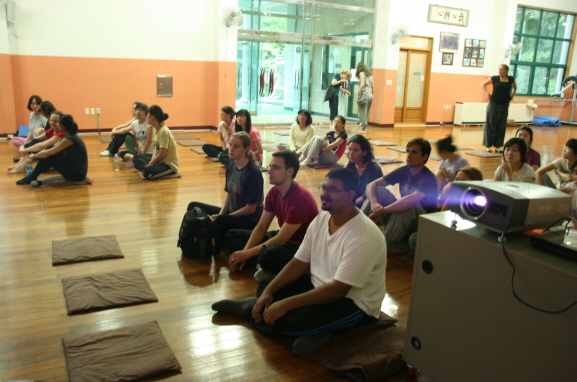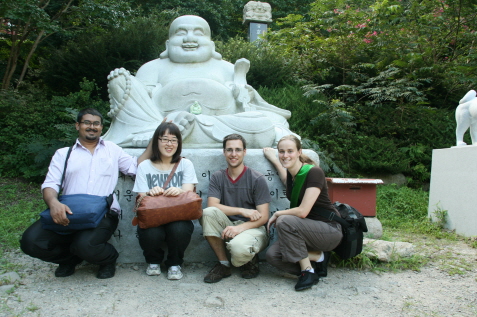
Three students who traveled together were Ronny Schlutter(22) and Regina Knobloch(20) from Germany, and Arghya Bhowmik(23) from India. Ronny and Regina are exchange students from the Technical University of Berlin who have just arrived in Korea.
“I was always interested in Asia. Looking at the exchange programs from our school, I found POSTECH. The more and more I read about it, the more I liked it. I’m extremely excited about the research program for undergraduates,” explained Regina to my abrupt question about her reason for coming to POSTECH.
The two hours on the bus it took to reach the temple was enough time to get to know more about these friends. I sat next to Arghya, a graduate student from GIFT. He has been in Korea for about a year and seems to have traveled more parts of Korea than I have. Looking out the window while the bus was driving through the winding roads of Gyeongju, he told me, “This place is so beautiful in the spring. It’s covered with cherry blossoms.”
‚óą Feeling the breath of Zen
As a courtesy of the temple, a van picked us up from the bus stop. We filled out the application form assisted by a foreign guide. One of the advantages of Golgul Temple is that most monks and instructors can speak English.
Since we had time till the start of scheduled program, we hiked up the steep hill to the main shrine. The most excited person was probably Ronny, who zoomed up and down the hill, urging the rest of us to hurry up. He asked so many things to me that even seemed insignificant to Korean eyes at first glance, but he insisted, “Since I’m here in Korea for only a year, I have to be curious in everything I see.”
Climbing the cliff dotted by a series of rock caves with shrines used by monks, we finally reached the peak to see Maya Tathagata Buddha carved into the cliff. I was amazed at how knowledgeable Arghya was about Buddhism even though he was a Hindu. He explained the meaning of sculptures placed in rock caves and the history of the spread of Buddhism from India to Korea.
We headed down to the dining hall, where dinner was awaiting us. All of us engulfed everything that we took and trudged up the hill to see an introductory TV program on Sunmudo. Sunmudo, only taught at Golgul Temple in Korea, is a Zen martial arts training, which is composed of Zen yoga and gymnastics. It is a training to harmonize the body, mind and breath to be enlightened.
The evening chanting made us finally feel as though we were at a temple. Regardless of the mosquito bites and the buzzing of flies, keeping a peaceful mind and an attitude of respect while bowing to our knees flat, drove all earthly worries away.
However, Sunmudo training following the chanting was somewhat challenging for everyone. Regina struggled to keep in balance and Ronny confessed that the leg stretching was very hard. Arghya did not want to mention anything about the training.
After watching the Sunmudo demonstration by instructors, which left us in awe, we went back to our respective dorms. There was a strict guideline that if a person doesn’t wake up at 5 a.m. for morning chanting, he or she must bow 3000 times as punishment. Horrified, we all went to bed as quickly as possible.
Morning came with exhilarating sounds of various phone alarms and wooden blocks (moktak). With our puffy eyes we read the Buddhist scriptures for pre-dawn chanting and practiced sitting-meditation for 30 minutes in silence.
The ceremonial Buddhist meal (Paru-gongyang) was a complicated way of having a meal, but the monk emphasized that the ceremony was done in a simple manner for many foreign visitors. However, we still had to make no noise when eating, clean off the plates with washed kimchi and wash down the leftovers with water. Arghya said, “The ceremony was interesting in that we could understand the value of the food we get.”

During the tea ceremony, I got to find out more about these friends. I was quite taken aback when the boys talked about games like Starcraft and Counter Strike, not realizing that these boys could also play them like Korean boys, but they soon went into deep conversation about political and social controversies in Germany and India. Regina and Ronny sounded concerned that they may not be able to participate in the next election in September in Germany. Regina claimed that most students in Germany of our age are very interested in domestic issues, but are frustrated. I envied their interest and wished that even if students in Korea are frustrated, they would at least focus their attention.
I popped a radical question for fun: “If there are only two professions in the world, a monk or Sunmudo trainer, which one would you choose?” Arghya wanted to be a monk, because he is more of a “thinking guy.” Regina wanted to be a trainer if she doesn’t have to be one forever. And Ronny just wanted to be himself.
Having completed the scheduled programs, we were ready to go back home. We looked at the Buddha and the securely nestled temple once more. “I have been in Korea for a year but I have never felt more at home,” Arghya said. I could not agree more. This trip was definitely worth going on. In the end, we not only knew more about Korean Buddhism but had a good experience in new places with good friends. We returned to Pohang and promised to see each other in the very near future.


